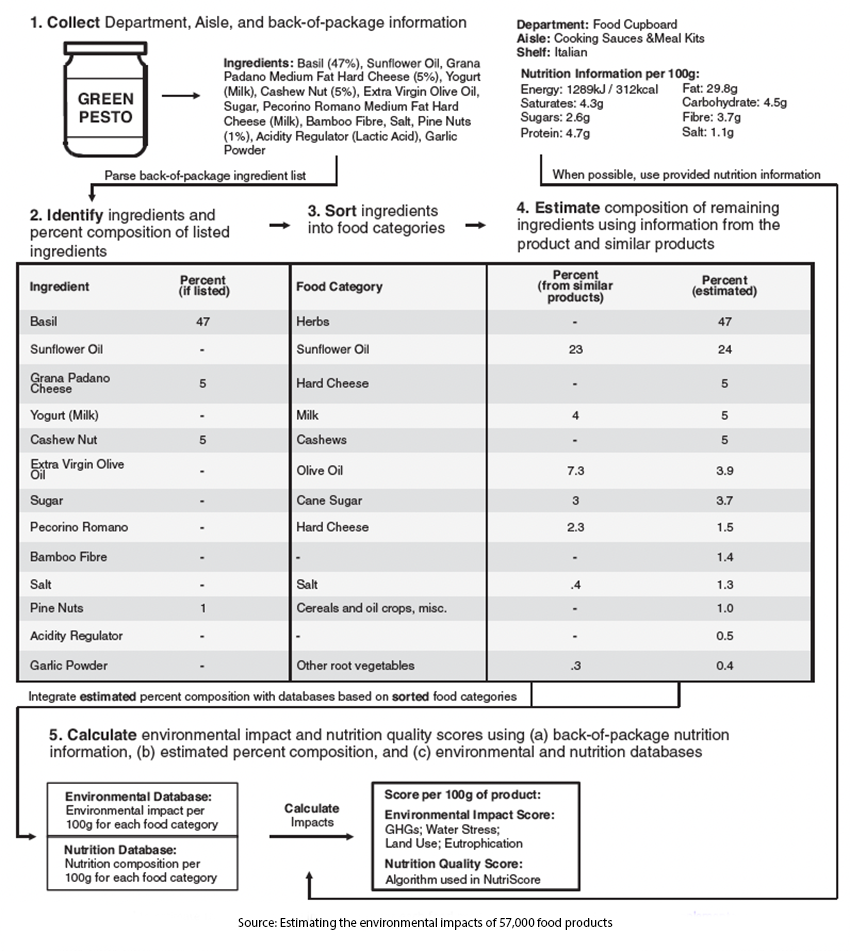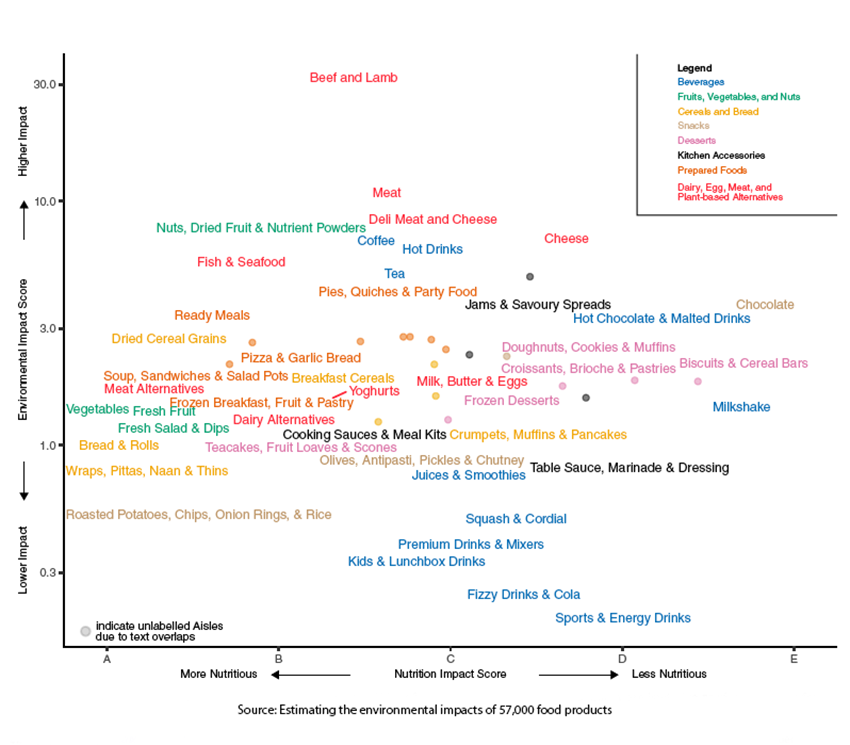The study, published in the Proceedings of the National Academy of Science (PNAS), presents a new tool for determining the environmental impact of the 57,000 typical food products found in UK grocery stores, specifically Tesco. It then meshes that data to show which nutritious foods are produced in a manner sustainable to Earth.
The tool
Of course, the tool is an algorithm designed to look through a large dataset and draw conclusions about the environmental impact of producing a specific food product. This is not an easy task, primarily because our food labels do not indicate the actual percentages of each ingredient; they only list their order, from most to least. The research algorithm generates a “first estimate,” a rough approximation, of environmental impact by using more specific information on similar products. This introduces the first of several uncertainties, because only 10% of products have specific percentages of ingredients.
The researchers constrained environmental impact to four categories, greenhouse gas emissions, water use, land use, and aquatic eutrophication potential (the excessive enrichment of water with nutrients resulting in “phytoplankton productivity). But this introduces another level of uncertainty because the transportation of food, farm to processing to retail, is not considered and can be significant in the case of off-season foods. Moreover, each of the four environmental impacts was weighted equally, even though we know of products where that is not the case, e.g., almonds produce few greenhouse gases but use much water. These uncertainties make for a “first estimate” – in the ballpark, but not necessarily on base. Here is the algorithm visually.
 On a scale from 1 to 100, where 1 is a low environmental impact and 100 is high, the median average was 1.4. To be in the 95th percentile, the impact had to be 14.1 – so most food products were environmentally sustainable. When comparing this algorithm to other sustainability calculations, two-thirds were within 10% of the alternative calculations, 85% within 25%; again, this is not an unreasonable first estimate.
On a scale from 1 to 100, where 1 is a low environmental impact and 100 is high, the median average was 1.4. To be in the 95th percentile, the impact had to be 14.1 – so most food products were environmentally sustainable. When comparing this algorithm to other sustainability calculations, two-thirds were within 10% of the alternative calculations, 85% within 25%; again, this is not an unreasonable first estimate.
Can a food product sustain us and the earth?
And now to the critical question! To determine the sustainability of a food product to our health, the researchers used NutriScore, one of the many models of nutrient value. [1] Because all models are wrong, NutriScore is wrong because it doesn’t consider whether the food is processed at home or by a manufacturer. Those interested in how other scales handle “processing” can read here.

The graphic captures those foods that are sustainable to both us and the planet at the bottom left and those unsustainable foods to us and the earth in the upper right. There are a few surprises. First, according to this research, roasted potatoes and potato chips are good for you and Earth, comparable to vegetables and fresh Fruit. However, the latter has a more significant detrimental environmental impact. [2] Here are some other findings:
- Nutritional Win – Environmental Loss: fish and seafood, nuts, beef and lamb
- Nutritional Loss – Environmental Wins: sweet cakes and pies, table sauces, and sugary beverages. It seems you can drink a sugary beverage to help save the planet; perhaps we should rethink the taxes on sugary drinks or at least give a tax rebate for its environmental impact.
- Nutritional Loss – Environmental Loss: chocolate. According to the researchers, cookies with chocolate had “a 13% lower nutritional value and a 40% higher environmental impact.”
To give you a sense of how the ingredients in a food product can alter nutrition and environmental impacts, consider the sausage. Environmentally, beef or lamb was 240% worse than pork, which in turn was 100% worse than chicken, which was in turn 170% worse than vegan or vegetarian sausage. Nutritionally, beef, lamb, or pork was 20% more nutritional than chicken, which in turn was 75% more nutritional than the vegan or vegetarian options.
While MathMagic plays a role in the study’s results, it strongly suggests that what is nutritious for us may not be as “nutritious” for the Earth – natural is not automatically better.
“Nature never did betray the heart that loved her.”
– William Wordsworth
Could Wordsworth have been wrong when it comes to the intersection of nutrition and environmental impact?
[1] “NutriScore gives a numeric score to food products for each of seven food components: calories; salt; saturated fats; sugar; protein; fiber; and fruits, nuts, vegetables, and certain oils (olive oil, nut oils, and rapeseed oil). These numeric scores are then summed and converted into an A (most nutritious) to E (least nutritious) ranking….”
[2] This finding affirms my effort to defend the potato.
Source: Estimating the environmental impacts of 57,000 food products PNAS DOI:10.1073/pnas.2120584119




